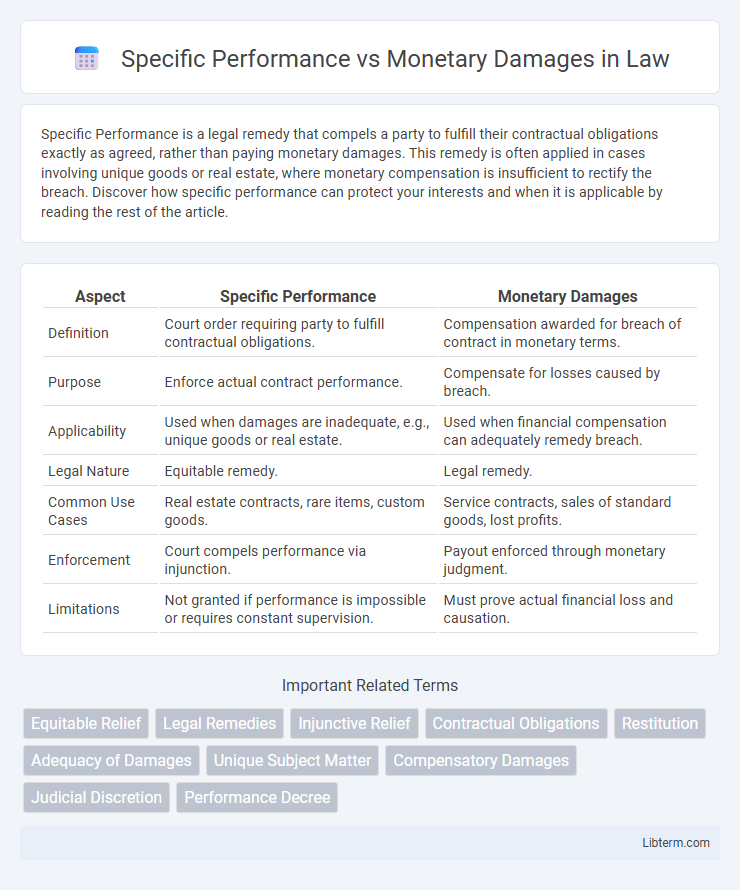Specific Performance is a legal remedy that compels a party to fulfill their contractual obligations exactly as agreed, rather than paying monetary damages. This remedy is often applied in cases involving unique goods or real estate, where monetary compensation is insufficient to rectify the breach. Discover how specific performance can protect your interests and when it is applicable by reading the rest of the article.
Table of Comparison
| Aspect | Specific Performance | Monetary Damages |
|---|---|---|
| Definition | Court order requiring party to fulfill contractual obligations. | Compensation awarded for breach of contract in monetary terms. |
| Purpose | Enforce actual contract performance. | Compensate for losses caused by breach. |
| Applicability | Used when damages are inadequate, e.g., unique goods or real estate. | Used when financial compensation can adequately remedy breach. |
| Legal Nature | Equitable remedy. | Legal remedy. |
| Common Use Cases | Real estate contracts, rare items, custom goods. | Service contracts, sales of standard goods, lost profits. |
| Enforcement | Court compels performance via injunction. | Payout enforced through monetary judgment. |
| Limitations | Not granted if performance is impossible or requires constant supervision. | Must prove actual financial loss and causation. |
Introduction to Legal Remedies in Contract Law
Specific performance and monetary damages serve as fundamental legal remedies in contract law, each addressing breaches differently to ensure contractual obligations are honored. Specific performance compels a party to fulfill their exact contractual duties, often applied in cases involving unique goods or property where monetary compensation is inadequate. Monetary damages provide financial compensation for loss or injury resulting from a breach, quantifying harm to restore the injured party's position prior to the contract breach.
Defining Specific Performance
Specific performance is a legal remedy in contract law that compels a party to fulfill their contractual obligations rather than paying monetary damages. It is typically granted when monetary compensation is inadequate, such as in cases involving unique goods or real estate transactions. Courts consider factors like the uniqueness of the subject matter and the feasibility of enforcement before ordering specific performance.
Understanding Monetary Damages
Monetary damages serve as a financial remedy intended to compensate the injured party for losses incurred due to breach of contract. They are categorized into compensatory damages, which cover direct losses, consequential damages for indirect consequences, and punitive damages meant to punish wrongful conduct. Courts calculate these damages based on evidence of actual harm, aiming to put the plaintiff in the position they would have been if the contract had been fully performed.
Key Differences Between Specific Performance and Monetary Damages
Specific performance compels a party to fulfill contractual obligations, ideal for unique goods or real estate where monetary damages cannot adequately compensate. Monetary damages provide financial compensation for losses caused by breach of contract, emphasizing quantifiable economic harm. Key differences lie in enforcement: specific performance is an equitable remedy demanding action, while monetary damages are a legal remedy focused on financial restitution.
Situations Favoring Specific Performance
Specific performance is favored in situations involving unique goods or real estate where monetary damages cannot adequately compensate the injured party. Courts often order specific performance in transactions related to rare artwork, custom-made products, or properties with distinctive characteristics. This remedy ensures the buyer receives the exact item or property agreed upon, preserving the value derived from uniqueness that damages alone cannot restore.
Circumstances Suited for Monetary Damages
Monetary damages are best suited for breach of contract cases where financial loss can be accurately quantified and compensated through a cash award. Situations involving readily replaceable goods or services, such as the purchase of commonplace items or standard commercial contracts, typically warrant monetary damages. Courts prefer monetary awards when enforcement of specific performance would be impractical, burdensome, or when the subject matter is not unique or irreplaceable.
Legal Requirements for Granting Specific Performance
Specific performance requires the plaintiff to prove the inadequacy of monetary damages as a remedy and the existence of a valid, enforceable contract with clear and definite terms. Courts typically grant specific performance when the subject matter is unique, such as real estate or rare goods, making monetary compensation insufficient to make the injured party whole. The requesting party must also show they have fulfilled all contractual obligations and that enforcement is equitable and feasible under the circumstances.
Limitations and Defenses to Specific Performance
Limitations to specific performance include the requirement of a unique subject matter, making it unsuitable for contracts involving fungible goods or personal services due to impractical enforcement. Defenses to specific performance often rest on the plaintiff's laches, unclean hands, or the existence of an adequate remedy at law, such as monetary damages. Courts may also deny specific performance when enforcement would cause undue hardship or require continuous supervision.
Choosing the Appropriate Remedy: Factors Courts Consider
Courts consider several key factors when choosing between specific performance and monetary damages, including the uniqueness of the subject matter, the adequacy of monetary compensation, and the practicality of enforcing specific performance. Contracts involving real estate or rare goods often justify specific performance due to their irreplaceable nature. Courts also evaluate whether monetary damages would sufficiently remedy the harm or if an equitable remedy is necessary to ensure fairness.
Case Studies: Specific Performance vs Monetary Damages
Case studies illustrate that courts award specific performance primarily in unique property disputes, such as real estate contracts where monetary damages insufficiently compensate losses. In contrast, monetary damages are prevalent in commercial contract breaches, providing financial restitution when exact performance is impractical or unnecessary. Notable cases like Lumley v. Wagner emphasize specific performance for unique services, while Hadley v. Baxendale highlights the limitations of damages based on foreseeability and causation.
Specific Performance Infographic

 libterm.com
libterm.com